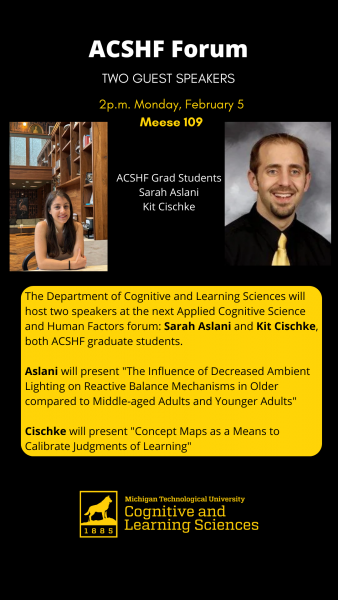The Department of Cognitive and Learning Sciences will host two speakers at the next Applied Cognitive Science and Human Factors forum: Sarah Aslani and Kit Cischke, both ACSHF graduate students. Their presentations will be from 2:00 to 3:00 p.m. Monday (February 5) in Meese 109.
Aslani will present “The Influence of Decreased Ambient Lighting on Reactive Balance Mechanisms in Older compared to Middle-aged Adults and Younger Adults”
Abstract:
Falls, a significant health concern, particularly impact the elderly, with an estimated 30 million incidents annually in the United States alone. Older adults face increased fall risks due to factors like gait variability, reduced strength, sensory decline, and environmental hazards. Postural control, vital for preventing falls, involves a complex interplay of visual, vestibular, somatosensory, and neuromuscular systems. Reactive balance, crucial for avoiding falls, is affected by aging and lighting conditions. Aging contributes to sensory and motor decline, impacting muscle function, coordination, and walking abilities. Visual and vestibular systems play essential roles in postural control, and their decline with age affects balance. Dark environments accentuate the reliance on the vestibular system, influencing balance recovery. Few studies explore the impact of dim lighting on balance recovery, especially in older adults. This study aims to investigate the differences in reactive balance control among older, middle-aged, and young adults in decreased ambient lighting conditions. The hypothesis suggests that dark
environments will decrease overall balance recovery ability in older adults compared to younger and middle-aged groups. Additionally, it predicts that balance recovery stepping characteristics, especially response initiation time, will be more adversely affected in the dark for older adults. This research contributes to understanding the age-related variations in balance control, particularly in challenging lighting conditions, offering insights for fall prevention strategies.
Cischke will present “Concept Maps as a Means to Calibrate Judgments of Learning”
Abstract:
Students often struggle with accurately assessing their own knowledge, also known as metacognition. They frequently rely on unreliable cues such as material familiarity or past homework grades and adjust their studying habits accordingly. In the context of learning new material, a metacognitive assessment of this type is referred to as a “judgment of learning” (JOL). Delaying a JOL after learning the material has been shown to lead to more precise judgments, which is thought to be due to a covert memory access made for the material. Concept maps are diagrams used in various fields to visualize knowledge, particularly the connections between concepts. They mimic the structure of human memory and require both overt and covert memory accesses when creating or reviewing them. Between the memory accesses in a constructive activity, concept mapping, and the testing effect (where testing increases retention of material), concept maps may be an effective tool to calibrate JOLs. This talk discusses some experimental findings on JOL calibration in a situation where the material to be learned is conceptual and there is a self-directed study period before the assessment. The material was technical in nature and new to all of the subjects. Some subjects made a numeric JOL, some completed a concept mapping activity before the JOL, and some did neither. We compare the study times, JOL calibration, and test results of the subjects. The results suggest that concept mapping, when used as an educational intervention in the classroom, can positively influence study efforts and test outcomes while being considered relatively enjoyable by the students.
